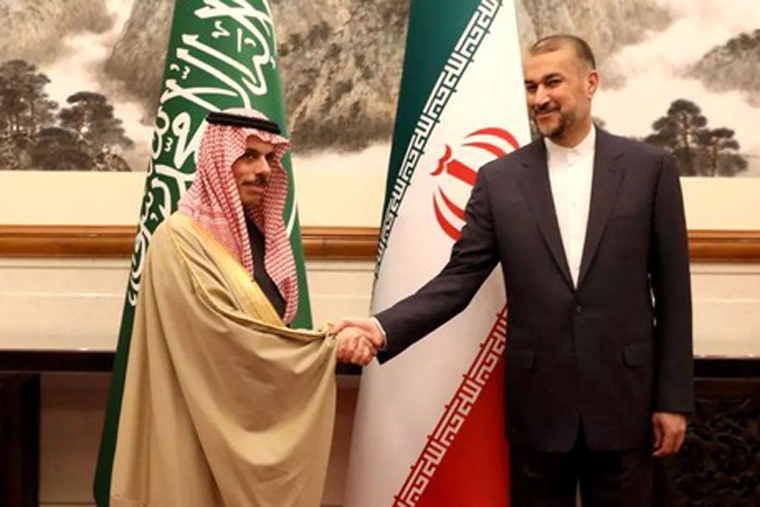
RIYADH, April 9, 2023 (BSS/AFP) - A Saudi delegation arrived in Tehran Saturday to discuss reopening the kingdom's diplomatic missions in the Islamic republic, two days after a historic meeting in Beijing between their foreign ministers.
The visit follows the unprecedented meeting between their heads of diplomacy in China on Thursday after they agreed last month to restore diplomatic ties.
The Saudi diplomatic delegation arrived in Iran to discuss the reopening of its missions after a seven-year absence, Riyadh's foreign ministry said.
Cited by the official Saudi Press Agency (SPA), the ministry called the visit part of "implementing the tripartite agreement" reached on March 10 between the two regional powers, brokered by China, to restore ties ruptured in 2016.
The two longtime Middle East rivals have now pledged to work together.
When Saudi Foreign Minister Prince Faisal bin Farhan and his Iranian counterpart Hossein Amir-Abdollahian met in Beijing on Thursday they vowed to bring security and stability to the turbulent Gulf region.
"The two sides emphasised the importance of following up on the implementation of the Beijing Agreement and its activation in a way that expands mutual trust and the fields of cooperation and helps create security, stability and prosperity in the region," a joint statement said.
On Saturday, a Saudi "technical delegation" met Iran's chief of protocol, Mehdi Honardoust, at the foreign ministry in Tehran, SPA said.
- Turbulent region -
The two countries severed ties after protesters in the Islamic republic attacked Saudi diplomatic missions following Riyadh's execution of a prominent Shiite cleric.
The shock rapprochement between mainly Sunni Muslim Saudi Arabia, the world's biggest oil exporter, and Shiite-majority Iran, strongly at odds with Western governments over its nuclear activities, has the potential to reshape relations across a region characterised by turbulence for decades.
Under last month's agreement, the two countries are to reopen their embassies and missions within two months and implement security and economic cooperation deals signed more than 20 years ago.
Iranian President Ebrahim Raisi has also been invited by Saudi King Salman to Riyadh, a trip planned to take place after the holy fasting month of Ramadan which ends later in April.
Rabha Saif Allam, specialist in Middle Eastern affairs at the Cairo Center for Strategic Studies, noted "an acceleration" in the normalisation of ties.
She said this means an intensification of meetings "at the economic and security levels", and believes normalisation will be sealed by Raisi's planned visit to Riyadh at the end of April.
The United States has for decades been the key diplomatic power in the Middle East and has an alliance, albeit a frequently strained one, with Saudi Arabia.
Washington has cautiously welcomed the rapprochement between the Saudis and US adversary Iran despite the role of China, which it sees as its biggest global challenger.
Iran and Saudi Arabia vie for influence in Syria, Lebanon and Iraq.
They also support rival sides in several conflict zones across the region, including in Yemen, where Huthi rebels are backed by Tehran and Riyadh leads a military coalition supporting the government.
In a separate development on Saturday, Omani mediators arrived in the Yemeni capital Sanaa to discuss a new truce between the Iran-backed Huthi rebels and Saudi Arabia, an airport source said.
Diplomatic efforts to resolve the conflict have multiplied since the Chinese-brokered Saudi-Iran deal to restore relations.